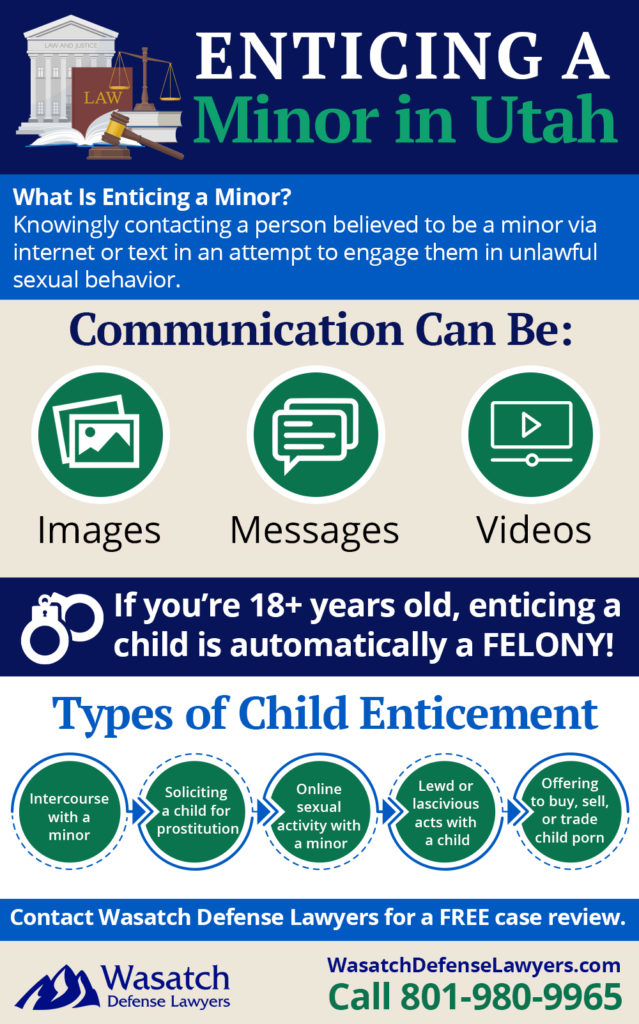What is Enticing a Minor in Utah?

Anytime you are accused of a criminal offense, your freedom and quality of life are at risk. When those charges involve the enticement of a minor, the penalties and public scrutiny are incredibly high. If accused, you face the full force of the state’s resources and it’s imperative that you work with an experienced criminal defense attorney, such as that will defend your rights.
What is Enticing a Minor?
We have all heard a great deal of media reports about minors being “enticed” with the rise of widespread Internet and electronic device usage. But these crimes are not limited to online attempts by adults to lure children for illicit and illegal reasons.
In the eyes of the law, a minor is anyone under the age of 18. That’s when people are considered old enough to make decisions without parental guidance. That being said, there are legal challenges that involve youths that reach the age of maturity while still interacting with peers that are still considered minors.
In the current information climate, Utah has placed a focus on the use of electronic communication as a primary concern. The state deems all such communications “text messaging.” It’s important to understand that this has become a catch-all legal phrase that includes sending images, messages, videos or any type of information from any electronic device in an attempt to engage in sexual activity with a minor. The courts make no distinction between phone or computer when it comes to an unlawful communication with someone who is underage. It’s important to note that other forms of non-electronic communication can also be regarded as a vehicle of enticement.
What Constitutes Enticement?
An adult commits enticement when they attempt to wrongfully persuade a minor to engage in sexual activity or unlawful conduct using written or electronic communication. Under Utah law, terms such as lure, solicit and seduce are commonly used to describe the process.
These are some of the key elements to the legal standard of enticing a minor in Utah.
- Knowingly using the Internet or text messaging to contact a person believed to be a minor.
- Attempts to persuade a minor to engage in illegal, illicit or unlawful sexual behavior.
Another important aspect to charges involving the enticement of a minor is that the standard holds even if the contacted person works for law enforcement in some capacity. Undercover operatives believed to be minors are commonly used to detect potential threats to minors. The key factor involves the adult’s belief the person is under 18 years old and engages in a type of persuasion that leads to wrongful conduct. Generally, entrapment can be a very difficult criminal defense in these cases.
Penalties for Enticement
The State of Utah uses a series of prohibitive and detection policies in an effort to protect minors from abuse. Persons found guilty of enticing a minor are subject to a variety of monitoring tools by law enforcement. Once found guilty of enticement, Utah collects a DNA specimen and keeps it on file for forensic comparison in a criminal database. Your sample will be used in future or past cases involving sex offenses and crimes against children, among others.
A felony enticement conviction restricts a person’s ability to purchase, possess or control a firearm and ammunition for life. Felons must also register as sex offenders for life. Utah does not allow felons to remove their names from the registry and they must register in any state they reside. If convicted of a misdemeanor offense, a 10-year registry is required after the completion of the sentence.
Other criminal penalties for enticement of a minor for sexual activity include:
- Second-degree felony record upon first conviction.
- First-degree felonies are punishable by incarceration for no shorter term than three years and which may be for life, upon a second or any subsequent conviction.
- More than one first-degree felony conviction can result in life imprisonment.
Utah has taken a strong stand in this area of criminal law. Guidelines do not allow judges to impose lower than minimum sentences for defendants with previous sex crime convictions. Defendants with prior sex offense convictions may not plead to lessor charges.
The State of Utah has taken a tough stance on charges involving children across the board. If found guilty of enticing a minor, you could face high fines, jail time, a permanent criminal record and a lifetime of public scrutiny. An enticing a minor conviction would limit your job opportunities and could negatively impact you for the rest of your life.

If the state levels enticement allegations or charges against you, it’s imperative that you work with an experienced criminal attorney. Call Wasatch Defense Lawyers for a no-obligation case review today.
- What Happens After You’re Accused of a Sex Crime in Utah? - February 27, 2026
- Utah Sex Crimes Defense Lawyer - February 27, 2026
- Criminal Charges in Utah: First Steps to Protect Your Rights - February 24, 2026
